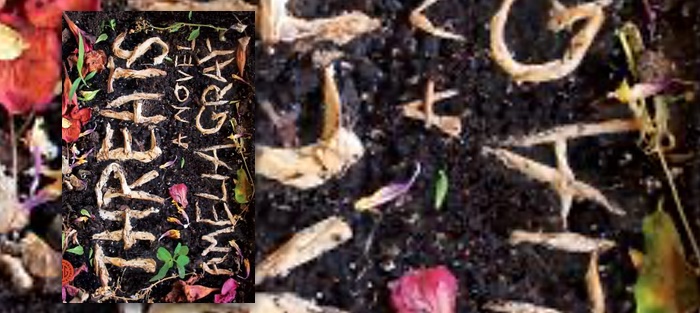Editor’s Note: For the first several months of 2022, we’ll be celebrating some of our favorite work from the last fourteen years in a series of “From the Archives” posts.
In today’s feature, Lee Thomas reviews Amelia Gray’s debut novel, Threats. The review was originally published on April 2, 2012.
As a doctor can imagine the variety of disease and injury that might fell the body, a critic worth her salt can anticipate the words that will appear in other reviews. Therefore, I ban the following words from this one: weird, post-modern, experimental, inscrutable, eerie, and Charlie Kaufman. Now then.
Amelia Gray’s debut novel, Threats (FSG Originals), follows her two story collections, AM/PM (2009) and Museum of the Weird< (2010). (Doesn’t count in a title, people.) Gray excels at evoking mood. But like the ground in an earthquake, you can’t rely on past experience to dictate expectations. You get this from the stories, but here Gray’s larger canvas allows for curious resonances and even further distortions. The facts seem clear: David, a failed dentist, loses his wife, Franny, a cosmetologist. He doesn’t so much lose her as witness her death, one that remains mysterious and unexplained for the entire book.
She was standing at the bottom of the stairs. She held the rail and tipped her head back to look at her husband. They held the same rail. “You’ve been tromping berries,” he said.“It’s blood.” She held the stair’s rail …
Gray creates an unsettling physical presence with that rail, the narrative eye drawn to it like a magnet, even with a blood-soaked Franny the most important thing in the room. Anyone who has encountered violence can attest to the randomness of what details remain: the color of your attacker’s shoelaces, the pigeon with a French fry in its beak just before the window shattered.
Throughout the book, David listens to the final message Franny left on the home answering machine (there’s one for the time capsule). Through repetition it transforms into a cipher.
Hey. Please wash and prep the vegetables before I get home. We’re in a hurry. Sorry. See you.
The things we leave behind: the ghosts of unexecuted intent, best laid plans.
Threats meanders. David begins finding typed, handwritten, scribbled threats hidden in the crevices of his and Franny’s shared life. Tucked behind picture frames, sitting on counters where they hadn’t been before, among Franny’s things from the beauty parlor – they appear everywhere.
I WILL CROSS-STITCH AN IMAGE OF YOUR FUTURE HOME BURNING. I WILL HANG THIS IMAGE OVER YOUR BED WHILE YOU SLEEP.
Both vague and terrifying, Gray’s capacity for evoking menace remains unflagging throughout:
I WILL LOCK YOU IN A ROOM MUCH LIKE YOUR OWN UNTIL IT BEGINS TO FILL WITH WATER.
Has Franny been stalked for years, or could these threats somehow be from her, albeit requiring a bit of supernatural finagling? Has the universe learned how to type? These threats are artful, fascinating, and unexplained.
 Curious interludes ensue: a woman who appears to live at the Laundromat; a detective, Chico, as hapless as Clouseau; a therapist, Marie, who squats in David’s garage, continually stung by resident wasps; David’s doppelganger loose in the neighborhood. These are but a few phenomenon in Ms. Gray’s phantasmagoria. It creates a level of discomfort in the reader, amid characters who themselves undergo no small level of bafflement.
Curious interludes ensue: a woman who appears to live at the Laundromat; a detective, Chico, as hapless as Clouseau; a therapist, Marie, who squats in David’s garage, continually stung by resident wasps; David’s doppelganger loose in the neighborhood. These are but a few phenomenon in Ms. Gray’s phantasmagoria. It creates a level of discomfort in the reader, amid characters who themselves undergo no small level of bafflement.
This novel gives a litmus test to its audience: will you revel in the cross-currents of David’s strange trip, or will you tense up and refuse to fall under the hypnotic qualities of Gray’s work? There is no right answer, but like sitting in the dentist’s chair: it helps if you relax. As Marie, the interloping mental health professional, says, “If you release yourself to the potential of help, anyone can be helpful.” Do you enjoy the ride or fault it for not being as expected? Then again, how did you form that expectation? Damn, but Amelia Gray is brave. Not many young authors debut with a long, hard gaze into the void.
David puts many things into his mouth, as though consumption equaled control, comprehension, and comfort. An infant’s approach to the world: curiosity expressed through taste. The novel subverts its own repetitions, in a way that allies us with David’s oral fixation—it sounds quite nice to find solace in the familiar, warm, and confined space of a mouth. Yet even this image becomes strange, when one encounters this description of a kiss:
She pressed her face down with the idea of crushing him and kissed his tongue and teeth, sucking the fluids there, tasting bitter coffee and mouthwash, internalizing his mouth, pressing his face harder and licking the strangely flat surface of his back teeth, wishing for a moment that she could take his teeth in her mouth and chew on them, feel the foreign against familiar, his teeth embedding in her cheeks like cloves in an orange.
Patently disgusting, yet transfixing, and if the reader steps back a moment to think of the romantic kisses of literature, it begins to dawn that they are, in fact, romanticized. Gray’s wholly grotesque description may be closer to the truth, but it also begs the question of why we were so concerned with accuracy in the first place, when the un-gilded lily can be, well, revolting.
Like a kaleidoscope, shift your perspective one degree and the entire horizon line of Threats cants wildly. A tale of justified paranoia, shift a bit and the novel resolves into a case study of mental breakdown, then again, and it becomes a tactile wedding of squalor and grief. Even the act of reviewing—attempting to describe the work—feels uncomfortably revelatory: for me the book captured the anguish of losing the one person who kept chaos at bay. David’s life may have been eroding slowly before, but Franny’s death sends the flood roiling, black and ominous, to the rafters. It’s a book of loose ends, frustrations, non sequiturs, Winchester Mansion stairways that end in a blank wall. In short, welcome to life.
Grief is a whirlpool drawing matter and debris unto itself: behold the wreckage. But Gray’s novel implies a larger darkness, too. Death is a black hole pulling meaning, coherence, and plot toward the event horizon, never to be heard from again. That’s a threat any mortal can understand.






